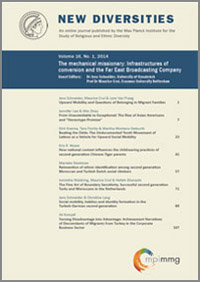Migrants, Associations and Home Country Development: Implications for Discussions on Transnationalism
by Joan Lacomba (Universidad de Valencia) and
Alexis Cloquell (Universidad Católica de Valencia)
To cite this article: Lacomba, J., & Cloquell, A. (2014). Migrants, Associations and Home Country Development: Implications for Discussions on Transnationalism. New Diversities, 16(2), 21–37. https://doi.org/10.58002/bpkn-np63
The extent to which migrants participate in development projects has gained increasing prominence in the field of migration studies. In keeping with the interest of national and international institutions which promote the involvement of migrants in the development of their home countries, social research has begun to question how this phenomenon has grown (on the migrant or transnational civil society level), the nature of the organisations that drive such actions (transnational organisations) and the implications on the latter (transnational development). Many studies have seen migrant organisations as new actors in the transnational field; when not seen as emerging players, they are perceived as figures that can shape the transnational field. In order to assess the impact of migrant associations in debates of transnationalism, this article investigates the characteristics of migrant organizations located in Spain, as well as their practices aimed at development in the countries of origin.
Keywords: migrants, associations, development, countries of origin, transnationalism
|
